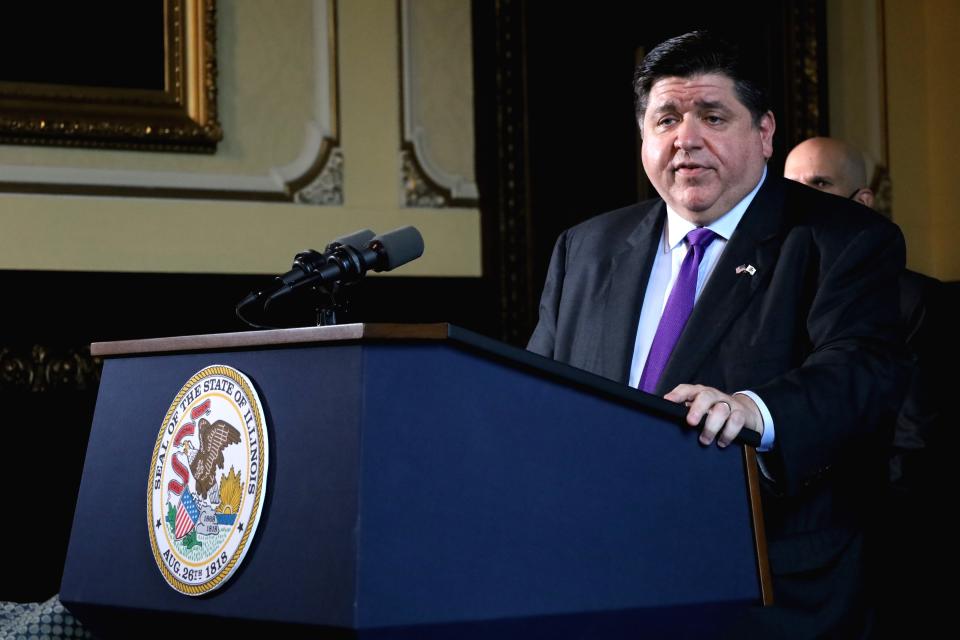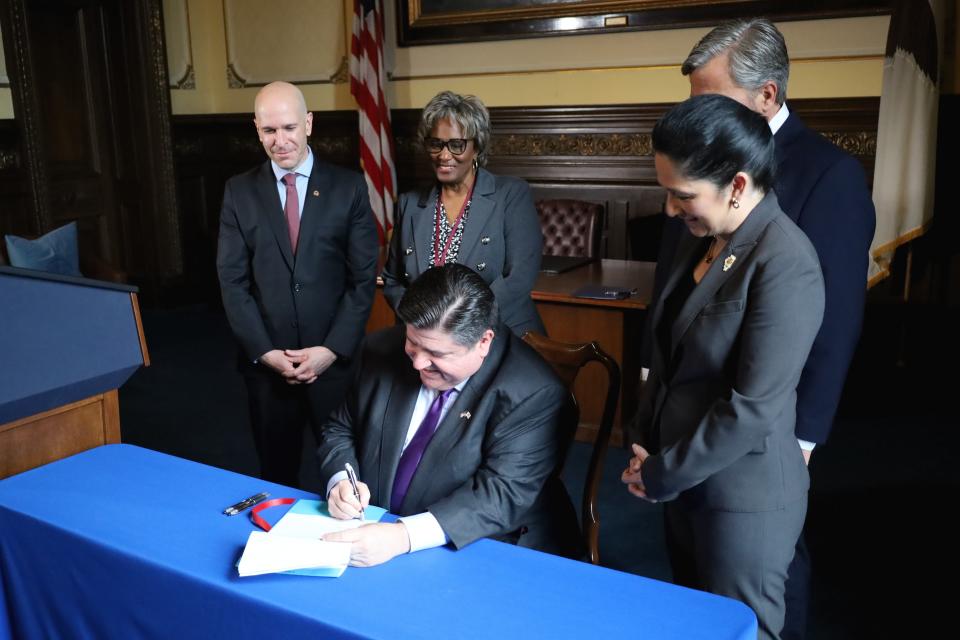Pritzker signs bill extending pension buyouts for state and university workers, teachers
- Oops!Something went wrong.Please try again later.
Gov. JB Pritzker on Thursday signed a bill into law that extends the state's pension buyout program, giving those on Illinois' pension rolls until 2026 to take a buyout.
The program's extended life comes with it authorization to borrow $1 billion of funds to pay for it using the same bonding method which originally funded the program in 2018 when it was introduced.
The bill, HB 4292, was passed with bipartisan support. The House approved the bill on a 108-2 vote in February and the Senate approved it 52-1 in late March. All no votes came from Republicans.
The buyout program gives members of state pension systems who no longer work the opportunity to receive a direct payment worth a portion of their pension benefits in exchange for giving up the remainder of those benefits.
Illinois budget: When it comes to fiscal responsibility, there's much to like about Pritzker's budget plan
Members who started working before 2011, called Tier 1 members, have the additional option to reduce the annual increases in their pension benefits in exchange for a lump sum payment -- sometimes called a cost of living adjustment (COLA) buyout.
The options are available to members of the pension systems that cover state employees, state university employees, and public school teachers.
Pritzker said in its first few years, the program has already reduced the state's pension debt by more than $1.4 billion.
"Responsible fiscal management means taking every action possible to address our pension obligations while honoring promises made to current and retired workers," said Pritzker.

Bill backlog reduced
Pritzker and Illinois Comptroller Susana Mendoza celebrated the initiative as part of a broader effort to improve the state's fiscal health with the governor touting a $500 million payment to reduce the state's unfunded pension liabilities in this year's budget.
Mendoza pointed to the fact that Illinois has reduced its bill backlog significantly, saying that the average length of time it took the state to pay its bills was 210 working days in 2017. On Thursday, she said, the oldest bill the state has yet to pay is 12 working days old.
The bill backlog became a point of contention during and after a budget impasse beginning in 2015. A partisan standoff between Democrats in the legislature and former Republican Gov. Bruce Rauner resulted in the state operating without a budget for just over two years.
On the legislative side, the bill's sponsors celebrated the policy as an example of legislative bipartisanship.
State credit rating: Here's why Moody's Investors Service gave Illinois a credit rating upgrade
Sen. Robert Martwick, D-Chicago, called himself a "quite a liberal Democrat." Despite his party allegiance, he gave credit for parts of the program and its extension to Rep. Mark Batinick, R-Plainfield, a conservative member of the House who co-sponsored the bill.
“I have been working on this plan for years and am pleased to see it has been effective for our state," said Batinick in a statement. "This is one of the ideas I am most proud of and it’s great that it will continue to help Illinoisans further into the future.”
Despite the positive outlook from lawmakers and the governor, pension liabilities and other post-employment benefits remain one of the major thorns in Illinois' financial side.
Illinois has lowest credit rating
The state still has $139.9 billion in unfunded pension liabilities as of June 2021, according to a November analysis from the state's Commission on Government Forecasting and Accountability.
The pension debts represent 62.5% of the state's long-term obligations, with $56.6 billion of other post-employment benefits making up another 23.3% of the state's debt, according to the most recent financial report from the state's comptroller.
The issue has been one reason that credit ratings of the state remain low, despite increasing slightly in recent months.
Fitch Analytics on Thursday announced a two-notch upgrade to the state's credit rating, increasing it from BBB- to BBB+. The agency said the change reflects "fundamental improvements in Illinois' fiscal resilience."
This credit rating is a tool for investors to use to analyze the risks associated with buying bonds from a particular government agency or company.
JB Pritzker: Governor signs bills addressing statewide teacher shortage, here's how they help
Despite the improvements, Illinois remains the lowest-rated state in Fitch's system.
"While the fiscal outlook continues to improve, structural gaps remain, primarily underfunding of pension contributions," wrote the credit rating agency in their assessment.
The assessment later found that despite the state spending $500 million over the statutory requirement for pension funding, it still lags behind in what actuaries say is necessary to fully fund the state's pension systems over time.
This comes two weeks after another of the three major credit rating agencies, Moody's Investors Service, announced they too upgraded the state's credit rating. In Moody's explanation of the credit bump, they also pointed out issues facing the state.
"These challenges include heavy long-term liability and fixed cost burdens that constrain the state's financial flexibility and contribute to a weak financial position compared to other states," Moody's wrote in April.

Republican lawmakers have criticized Democrats for using credit rating upgrades to suggest Illinois' finances are better than reality.
"Should [Pritzker] remain in office next year, he is going to be confronted with a major hangover after the federal money dries up and state spending is at a record high," said Senate Republican Leader Dan McChoncie, R-Hawthorn Woods, after Moody's announced its credit rating upgrade.
For their part, Democratic leaders have acknowledged that Illinois is not where it needs to be in terms of fiscal health.
"More work remains, but we've promised to restore financial stability and that's exactly what we're delivering," said House Speaker Chris Welch, D-Hillside, in a Thursday statement.
Contact Andrew Adams: aadams1@gannett.com; (312)-291-1417; twitter.com/drewjayadams.
This article originally appeared on State Journal-Register: JB Pritzker signs pension buyout bill, celebrates IL credit upgrade

